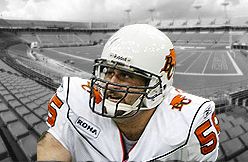The tenth anniversary of the September 11, 2001 attacks is Sunday, and that's led to some excellent pieces reflecting on how that day's events changed the world of sports. The effects weren't just felt south of the border, either, as many of them extended to Canada. TSN is running a series of features this week looking back at 9/11, and one of the most powerful aired on Friday's CFL on TSN pre-game show, with sportscaster Brian Williams (no, not the American one) talking to former B.C. Lion and recent Canadian national team member Sherko Haji-Rasouli (#55 above, seen during a 2007 game against Calgary) about his experience as a Muslim football player at the University of Miami in the days immediately following the attacks.
The piece (which you can watch in full here) started with a powerful montage of reactions to the attacks on American television, some of which seem almost unbelievable in retrospect. The televised reactions from prominent public figures included such lovely comments as "Islam is of the devil, it is causing billions of people to go to hell, it is a violent religion" and "Take your religion and shove it!" With that kind of atmosphere prevailing, it's tough to imagine what Haji-Rasouli went through, especially as football locker rooms aren't often the most tolerant or inclusive of environments. As Miami teammate Brett Romberg (a Canadian himself, from Windsor, Ontario, who would go on to an almost decade-long NFL career as a centre with the Jacksonville Jaguars, St. Louis Rams, Cleveland Browns and Atlanta Falcons) told TSN, "There were a lot of questions being raised, and Sherko looking the way he did, he became a target."
Under those kinds of circumstances, and in a locker room stuffed with dominant personalities like Jonathan Vilma, Jeremey Shockey, Ed Reed and Clinton Portis (seriously, look at the Hurricanes' 2001-02 roster: it's incredible), it would have been easy for Haji-Rasouli to either retreat into a shell or lash out. He did neither, though, instead opting to try and engage his teammates in constructive dialogue and teach them about his religion. He told TSN his message was simple.
"Generally, it was just 'Have tolerance towards people from the Middle East,'" Haji-Rasouli said.
He opted not to be confrontational or judgemental, but rather available and personable.
"I'm here to help," Haji-Rasouli said, describing what he did. "If I don't know the answer, I will go find the answer for you."
That approach had an impact, as Williams stated.
"Everyone we talked with down at the University of Miami at Coral Gables spoke of how Sherko taught them," he said.
It helped raise awareness and tolerance amongst teammates, and it also solidified Haji-Rasouli's status as a leader in the locker room. Amongst a group of future NFL stars who would go on to win the national championship that season, that's something to be proud of. Haji-Rasouli's efforts to promote tolerance towards Muslims were endorsed by many influential figures outside the sports world, too, including Muslim Canadian Congress founder Tarek Fatah, who told TSN Haji-Rasouli's actions were "an incredible display."
Haji-Rasouli took an unusual path to his football career. He was born in Shiraz, Iran on September 1, 1980, shortly after the revolution. His family moved to Canada when he was growing up, and he then headed to The U for college and was the Hurricanes' starting left guard in 2001. After playing there, he became one of the few guys from that class not to go on to the NFL, but had a very solid CFL career with the Montreal Alouettes and B.C. Lions from 2002-2011. Still, it's his impact at Miami (where he's now returned to pursue a master's degree) that might be the most notable. As former teammate Joaquin Gonzalez told TSN, Haji-Rasouli was a significant influence on his teammates for good in the wake of the horrific events of 9/11.
"There are good and bad people everywhere, and I think that's something he made us understand."

(sports.yahoo.com)



